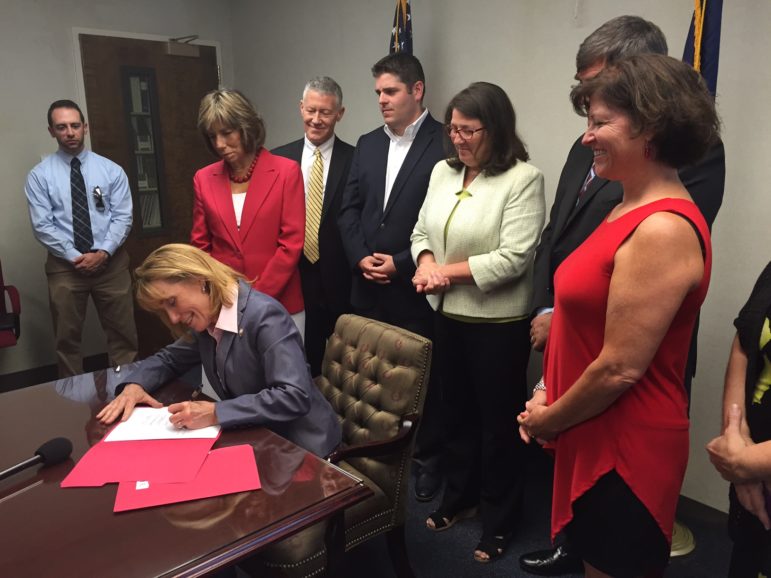
NASHUA, NH – Governor Maggie Hassan ceremoniously signed two bills Aug. 27 in Nashua, pushing the state closer to extending passenger rail to Manchester along the New Hampshire Capitol Corridor.
Senate Bill 63 will help make the Rail Transit Authority (NHRTA) both more efficient and more appealing to federal agencies seeking to invest in states with well-organized rail authorities, and Senate Bill 88 establishes a committee to study public-private partnerships for intermodal transportation projects.
During the signing ceremony at Nashua City Hall, Governor Hassan was joined by NHRTA Chairman Michael Izbicki, State Sen. Bette Lasky, D-Nashua, Nashua Mayor Donnalee Lozeau, Michael Skelton, President and CEO of the Greater Manchester Chamber of Commerce, and Tracy Hatch, President and CEO of the Greater Nashua Chamber of Commerce, along with business leaders and rail supporters.
“Senate Bill 88 and Senate Bill 63 mark important steps in the process of expanding rail along New Hampshire’s Capitol Corridor, which could have a transformative impact on our state’s economy,” said Izbicki. “Along with helping NHRTA operate more efficiently, this legislation could help open the door for New Hampshire to seek out alternative funding sources for critical infrastructure improvements, including rail. NHRTA, the state’s two largest Chambers of Commerce, 68 percent of New Hampshire residents and a growing list of businesses all agree that we need to invest in the state’s rail infrastructure, and this legislation gets us closer to that goal.”

Along with streamlining the membership of NHRTA’s board of directors, Senate Bill 63 also establishes an advisory board for NHRTA. Under Senate Bill 88, a legislative committee will identify potential revenue sources to fund passenger rail and other intermodal transportation options. These new sources of funding could help shift the burden from the state and enable New Hampshire to invest in its crumbling transportation infrastructure. The legislative committee has already begun studying these types of partnerships.
“A modern, safe transportation infrastructure is critical to the success of our people and businesses, and bringing commuter rail from Boston to Nashua and Manchester will help ensure that our people and businesses have the full range of modern transportation options that they need, help bring more young people to New Hampshire and help spur economic growth. Commuter rail is one of my priorities for attracting more young people to the Granite State and encouraging innovative economic growth, and I am proud to have signed these two bills that represent an important part of the process to moving commuter rail forward into law,” Hassan said.
Across the country, public-private partnerships are becoming a more viable option for financing needed infrastructure improvements. With $1 billion in private financing, a public-private partnership in Denver called the Eagle P3 Project is helping to construct three new commuter rail lines. The Louisville and Southern Indiana Bridges Authority is developing a major tunnel and bridge project as part of the Ohio River Bridges Project through a public-private partnership. The Virginia Department of Transportation is relying on a public-private partnership to redevelop a 14-mile stretch of its Capital Beltway, creating a managed-lane model.
“These types of partnerships carry a number of potential benefits, like engaging private sector innovation to help drive down costs which can help and sustain price certainty, even in long-term budgeting,” Izbicki said.
Thursday’s bill signing ceremony comes on the heels of an announcement last week that the Southern New Hampshire Planning Commission (SNHPC) had been awarded a $30,000 challenge grant to continue public education and advocacy for advancing commuter rail to Manchester. In an effort to keep up the momentum, SNHPC is using the challenge grant to engage key stakeholders, business leaders and the public to continue to build on a still-growing base of rail supporters.
Earlier this year, the state released the NH Capitol Corridor Study, which analyzed the 73-mile corridor from Boston, Mass., to Concord. The study indicated that the Manchester Regional Rail alternative, which would serve two stations in Nashua, one in downtown Manchester and one at the Manchester-Boston Regional Airport, would offer the greatest economic benefit with a relatively moderate investment.
The next step in the rail expansion process is the critical project development phase, which costs $4 million and consists of establishing a detailed financial plan, preliminary engineering, environmental permitting and preparation of funding applications for submission to the Federal Transit Administration and Federal Rail Administration.
To learn more about efforts to expand passenger rail in New Hampshire, please visit www.nhrta.org.
About the NH Capitol Corridor Study
In early 2015, a comprehensive analysis of the 73-mile corridor from Boston, MA to Concord, NH known as the NH Capitol Corridor Study was released which indicated that the Manchester Regional Rail alternative, which would serve two stations in Nashua, one in downtown Manchester and one at the Manchester-Boston Regional Airport, would offer the greatest economic benefit with a relatively moderate investment. After reviewing the results of the study, NHRTA voted to formally support extending passenger rail service to Manchester, with continued interest in extending passenger rail to Concord.
According to the study, the Manchester Regional Rail alternative would create approximately 230 jobs through construction of the rail line and an additional 3,390 construction jobs would be created to build real estate development generated by rail. Beginning in 2030, the expansion of rail would create 1,730 new jobs every year. Real estate development would add $750 million to the state’s output between 2021 and 2030, with reinvested earnings would add $220 million per year beyond 2030.
The total capital investment to bring passenger rail to Manchester is estimated at $245.6 million, but New Hampshire’s investment could shrink to $72 million with contributions from regional partners coupled with 50% federal support. The investment required to cover debt service on a 20-year bond and annual operating and maintenance costs would be $11 million annually.
About the NH Rail Transit Authority
The NH Rail Transit Authority (NHRTA) was established in 2007 and is tasked with encouraging and overseeing the redevelopment of passenger rail services throughout New Hampshire with an initial emphasis on the NH Capitol Corridor. The NHRTA is administratively attached to the New Hampshire Department of Transportation and consists of a nine-member board of directors comprised of the NH Department of Transportation, the NH Department of Resources and Economic Development, a member of the NHRTA advisory board, two representatives from the House Transportation Committee and four appointees by the governor. NHRTA’s board of directors takes guidance from an advisory board comprised of broad based membership from 14 cities and towns, 9 regional planning commissions, the NH College and University Council, the Manchester-Boston Regional Airport and three members appointed by the governor. Learn more at www.nhrta.org.
 You’re one click away! Sign up for our free eNewsletter and never miss another thing.
You’re one click away! Sign up for our free eNewsletter and never miss another thing.







